
The Commission will soon propose a secure European e-identity. One that we trust and that any citizen can use anywhere in Europe to do anything from paying your taxes to renting a bicycle. A technology where we can control ourselves what data and how data is used.
Ursula von der Leyen, President of the European Commission
Countries implementing digital ID could unlock value equivalent to 3 to 13% of GDP by 2030.
McKinsey Global Institute ‘Digital identification: A key to inclusive growth’ (April 2019 report)
The challenge today is to take digital identity in Europe to the next step. Every European should be able to rely on a digital identity that can be used widely and protects personal data.
The Council of the European Union recognises the importance of a digital identity for all:
The European Council calls for the development of an EU-wide framework for secure public electrronic identification (e-ID), including interoperable digital signatures, to provide people with control over their online identity and data as well as to enable access to public, private and cross-border digital services.
European Council Conclusions, 2 October 2020
A secure digital identity for all
One we all trust
To offer secure and trusted identification for the world of tomorrow, the European Commission will propose a new framework for a European Digital Identity for all that can be widely used online and protects personal data and privacy.
The European context
Building trust in the online environment is essential for a successful transition to a digital society.
Without trust, citizens and businesses are reluctant to engage in digital transactions.
Electronic identification (eID) and electronic trust services, such as electronic signatures, are key enablers helping European citizens to manage their digital identities.
They act as trust builders by providing certainty on the parties interacting electrronically.
A coordinated approach for Digital Identity at EU level is needed to allow citizens and business to benefit from the opportunities that the Single Digital Market offers for providing and accessing services across borders.
State of play
The Electronic Identification and Trust Services Regulation (eIDAS Regulation) for electronic transactions in the internal market
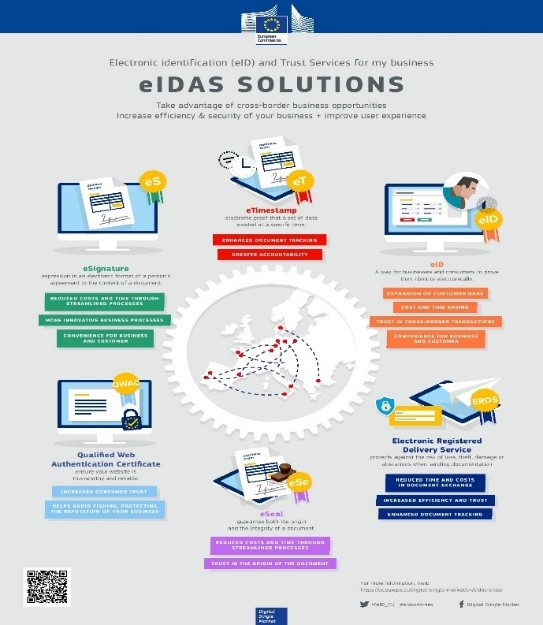
The eIDAS regulation proposes solutions to this challenge
eIDAS provides:
- legal certainty beyond national borders;
- a predictable regulatory environment for a seamless cross-border recognition of eID and trust services.
eIDAS boosts:
- trust;
- security;
- convenience on-line, for government, businesses and consumers.
eIDAS also creates a European internal market for trust services, namely:
- electronic signatures
- electronic seals
- time stamps
- electronic registered delivery
- website authentication
eIDAS ensures that:
- trust services will work across borders;
- trust services will have the same legal status as traditional paper-based processes.
eIDAS ensures that people and businesses can use their own national eID schemes (eIDs) to identify themselves when accessing digital services in other EU countries
To become reality, eIDAS relies on digital infrastructures for eID and trust services deployed across the EU.
To support Member States and businesses in their implementation of eIDAS based infrastructures, the Connecting Europe Facility (CEF) programme is providing a set of generic digital building blocks.
The building blocks consist of technical specifications and standards with compliant software and dedicated services. They are the basic infrastructures that can be reused to facilitate the delivery of digital public services, offering basic capabilities that can be reused to integrate eID and trust services in digital public services across borders and sectors.
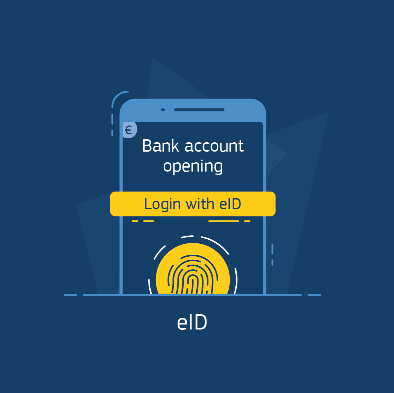

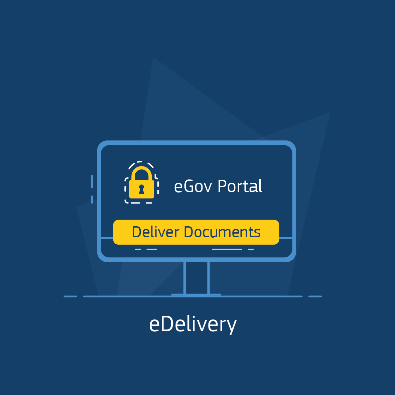
eIDs under eIDAS are also key to implement effectively the revised Anti-Money Laundering Directive, the Payment Services Directive II (PSD2), the Communication on "Tackling online disinformation".
eIDs under eIDAS in action
In practice
COVID-19 and similar times of crisis: How eID and trust services can help citizens and businesses
When face-to-face interaction is impossible, eGovernment solutions become vital.
Thanks to eID and eSignature, citizens do not need to leave their homes to interact with public administrations, they do not have to meet face-to-face to sign or even mail documents.
In times of crisis, this is another way to achieve social distancing. The use of trust services could also support companies around Europe (particularly SMEs that are most severely affected by the pandemic) by enabling the performance of most operations needed for business continuity (contracts/transactions) remotely.
Examples of the application of trust service solutions
eIDAS for filing a tax declaration
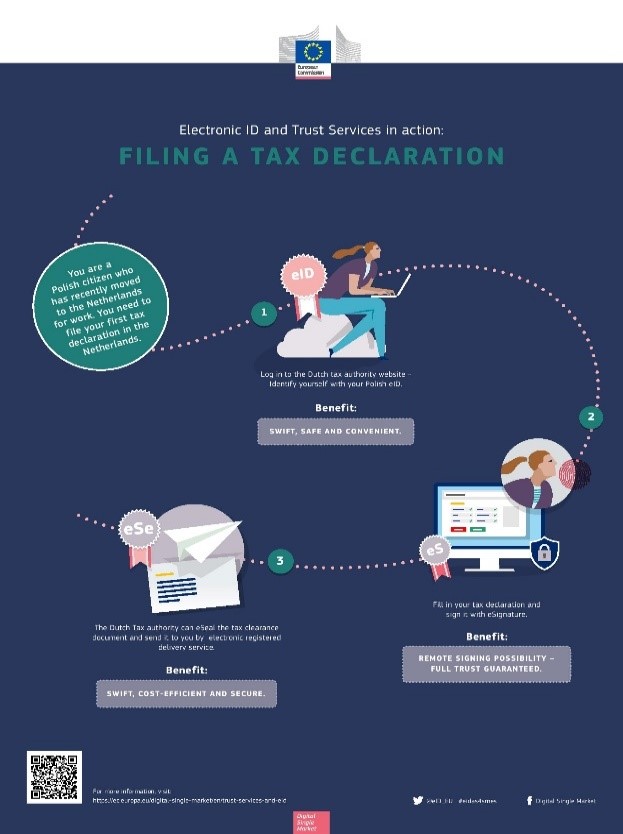
Magdalena is a Polish citizen who has recently moved to the Netherlands for work. She needs to file her first tax declaration in the Netherlands. She logs in to the Dutch tax authority website and identifies herself with her Polish eID. After filling out her tax declaration she signs it with eSignature. The Dutch tax authority can eSeal the tax clearance document and send it to her by electronic registered delivery service.
eIDAS: making Once Only Principle operational under the Single Digital Gateway from 2023 onwards
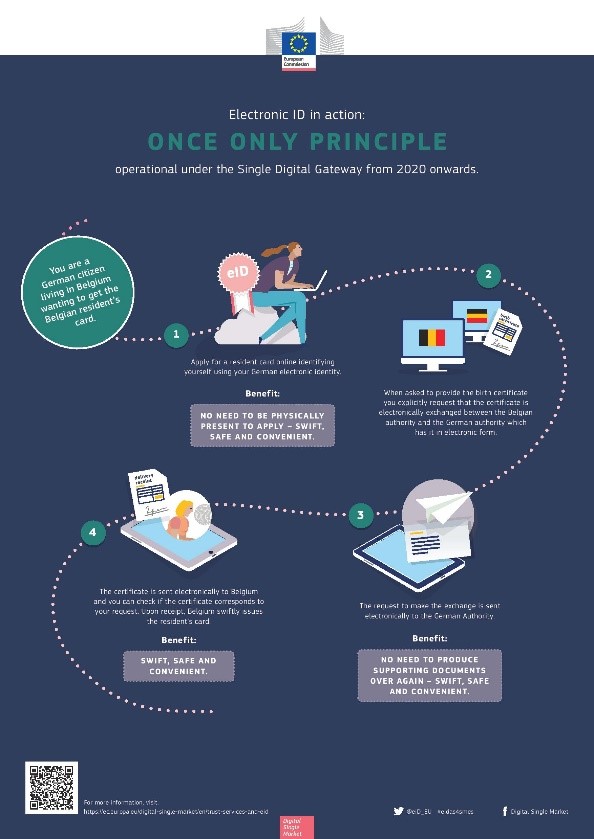
Lena is a German citizen living in Belgium and wants to get the Belgian resident’s card.
She can apply for the resident card online, identifying herself through her German eID. When asked to provide her birth certificate, she explicitly requests the Belgian authority to obtain it from the German authority, which has it in electronic form. Her request is electronically transmitted to the German authorities, which in turn sends the digital birth certificate to Belgium. Lena can check if it corresponds to her request. Upon receipt, Belgium swiftly issues the resident’s card.
More work needs to be done
The potential of eIDAS has not been fully exploited yet. More work needs to be done to offer all Europeans a digital identity that can be widely used online and protects personal data and privacy.
At the moment, 15 Member States are at various stages of notification of their national identify schemes, thus providing the opportunity to over 60% of the EU population to access public services in a cross-border context.
eID under eIDAS can only be used to identify in the public sector — this leaves for now most every-day use cases out of scope!
